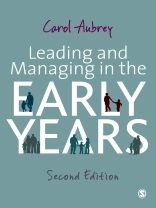…a major contribution to the limited literature and research on leadership in childhood education.′ –
Professor Tony Bush, Editor of Educational Management, Administration and Leadership
.
′This important book focuses clearly on evidence, describing the realities of leading and managing settings in times of rapid policy changes. Carol Aubrey manages to combine theory, research and practice in a book that will be invaluable to a new generation of early years professionals.′ – Angela Anning, Emeritus Professor of Early Childhood Education, University of Leeds, UK
′..skilfully draws on sound empirical research to present a grounded theory model for leadership in early years education. ….of interest to researchers, students and practitioners internationally.′ – Professor Nithi Muthukrishna, University of Kwa Zulu-Natal, South Africa
This Second Edition of Leading and Managing in the Early Years explores and integrates leadership and management practice with a real understanding of early years settings.
Revised and updated, this new edition includes:
– Two new chapters on private day care and reflective practice and action research
– Further coverage of reflective practice and reflective leadership skills
– More on EYPS as well as integrated centre leadership
– Practical suggestions for working with resistant groups and individuals.
Carol Aubrey investigates different concepts and characteristics of Early Childhood (EC) leadership as well as the roles and responsibilities of EC leaders. She also explores the types of leadership programmes or development which are needed to maximise the effectiveness of EC leaders.
This book is essential reading for students in Early Childhood courses, Early Years Practitioners and local authority employees involved with the integrated centres initiative.
Carol Aubrey is Professor of Early Childhood Studies at the University of Warwick.
قائمة المحتويات
Introduction: Theorizing Leadership in Early Childhood
The Early Childhood Leaders′ Agenda
Context
What Do We Know Already?
What Leadership Research Applies?
What Do We Need to Know?
Leadership in English Early Childhood Education and Care
Introduction
Our Objectives
What We Asked Our Early Childhood Professionals about Leadership
What We Found Out
What We Made of the Findings
Practitioners′ Understandings of Early Childhood Leadership
Introduction
Characteristics of the Leaders and Staff That We Talked to
Definitions and Perceptions of Leadership
Roles, Responsibilities and Functions of Leaders
Decision-Making
Internal and External Influences on Leadership
Training
Leadership in a Changing World
Early Childhood Leaders′ Work
Introduction
A Typical Day
Roles, Responsibilities and Functions
Decision-Making
Influences on Leadership
Training
Collective Views on the Video Highlights
′I Don′t Like the Idea of Making a Profit… Exploiting Those on Low Wages′
Introduction
Early Childhood Education and Care Policy
Early Childhood Profession and Workplace Issues
Making a Profit: The Role of the Private Sector
Preschool Care and Education plc?
Journeys into Leadership
Introduction
A journey?
Career Paths of Early Childhood Leaders
Support through the Career Cycle
Mentoring as a Leadership Strategy
Introduction
Learning from Experience
The Nature of Mentoring
Establishing Appropriate Ground Rules
What Does Learning from Day-to-Day Experience Really Mean?
A Framework for Staff Development
Mentoring for the Leader
Future Possibilities
The Challenge of Leading Multi-Agency Teams
Introduction
Challenges to Collaboration
Questions to Ask
What Do We know about Effective Multi-Agency Working?
Models of Multi-Agency Working
Organization of Professional Groups
Views on Multi-Agency Working from Four Integrated Centres
What we found out
A closer look at the challenges of multi-agency working
Case Studies
Leadership by the Many
Leading in a Time of Change
Introduction
A Need for Interprofessional Education
Staff Resistance to Change
A Model for Improving the Early Childhood Integrated Centre
Understanding Change
Reflective Practice and Action Learning
Introduction
Reflective Process of Progressive Problem-Solving
Planning an Action Research Cycle with Integrated Centre Leaders
Doing Action Research in the Early Childhood Field
Conclusions
Reflections
Revisiting Our Initial Objectives
Conclusions
عن المؤلف
Carol Aubrey is Emeritus Professor of Early Childhood in the Institute of Education at the University of Warwick. She trained as a primary school teacher and then as an educational psychologist. Later, she spent a number of years in primary teacher education with a particular focus on the early years, first at University College Cardiff and then at the University of Durham where she directed the Postgraduate Certificate of Education (Primary) and for a time was Deputy Director of the School. Thereafter, from 2001, she worked at Canterbury Christ Church University where she led the Centre for International Studies in Early Childhood (CISEC). Her research interests lie in the area of the policy to practice context of early childhood care and education in national and international contexts, early learning and development, with a particular interest in early mathematics and inclusion/special educational needs. She has been convener of the British Educational Research Association (BERA) Special Interest Group for Early Childhood Care and Education and a member of the BERA Executive Council from 2004 to 2007. She was UK editor for Journal of Early Childhood Research from 2003–2009.












